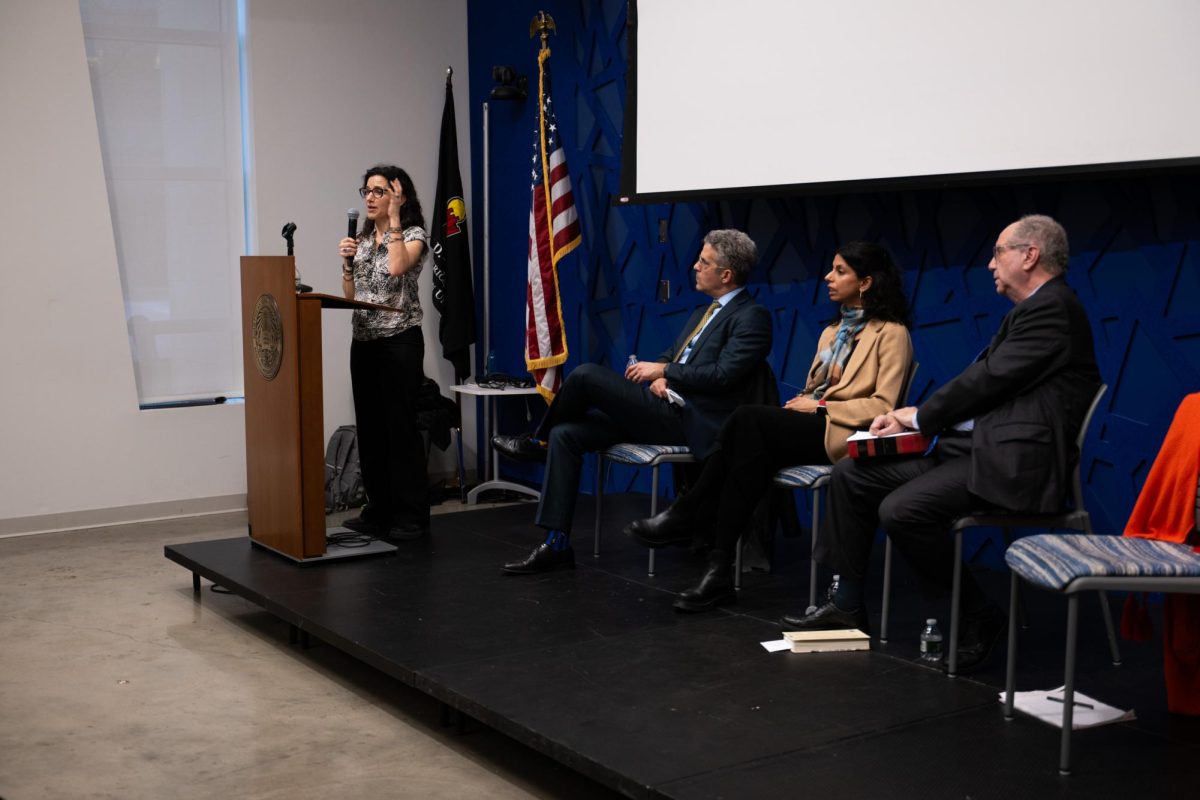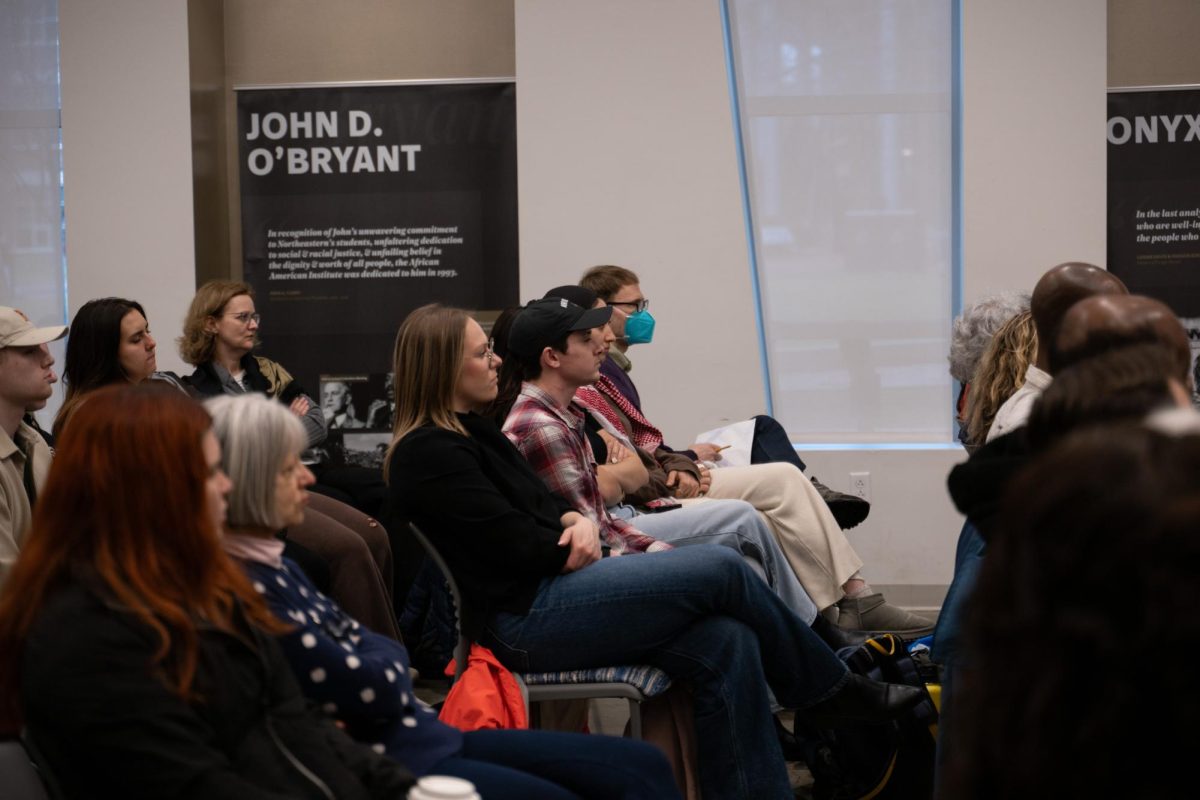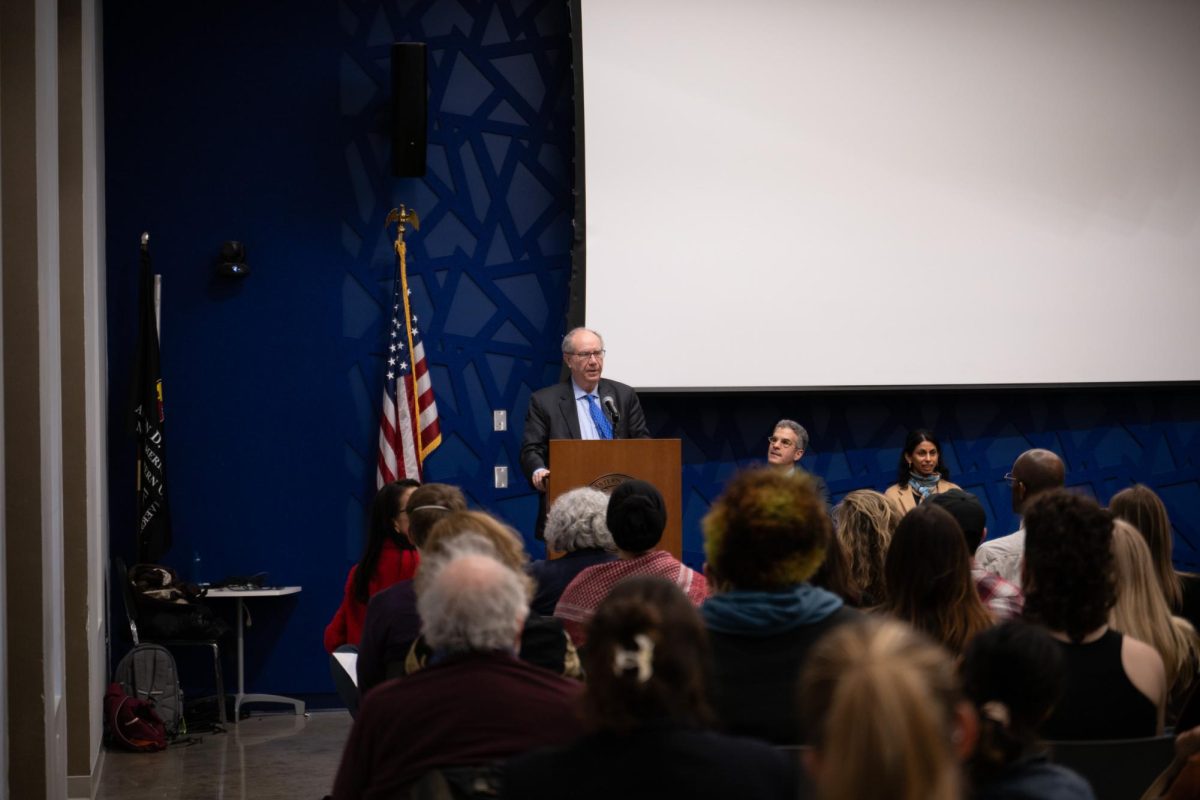
Elizabeth Scholl
Panel members watch as Gretchen Heefner speaks. The event raised questions from students about the university's response surrounding Trump's executive orders.
In the midst of President Donald Trump’s onslaught of executive orders — many of which target higher education institutions — Northeastern hosted the first event in a panel series designed to bring the university community together to discuss conflict, civility, respect and peace.
The March 17 event was the first discussion in the Northeastern Reflects Civility Series entitled “Fear, The State and Contemporary Executive Orders.” It was hosted in the John D. O’Bryant African-American Institute, and attracted a large audience that filled the room. Topics on the table were executive orders and how Trump has employed them, modern-day McCarthyism and its implications and a look at “the banality of evil.”
“I don’t feel like Northeastern has a space to talk about what’s happening politically right now, and Boston is such a bubble,” said Geneva Palmer, a third-year political science and criminal justice combined major. “It doesn’t really feel like there’s always next steps and advice provided, and I think that’s what a lot of people want right now.”
Featured on the panel were Professor and Department Chair of History Gretchen Heefner, Distinguished Professor of Philosophy and Associate Dean of Faculty Affairs Serena Parekh and Professor of Law Jeremy Paul. They were joined by moderator Daniel Medwed, a university distinguished professor of law and criminal justice. Medwed asked one question of each panel member, and then gave them 10 minutes to respond. After each member had answered the question, the floor was opened up to audience questions.
During the Q&A period, first-year Northeastern University School of Law student Samira Khadar was the first to raise her hand and be given the microphone.
“While I appreciate the academic, legal and philosophical conversation here … I think that this doesn’t really address the practical concerns that a lot of students on campus are having,” Khadar said.
“I’m curious why the [Northeastern’s] administration has failed to address those concerns for international students so far, and are not providing any resources,” she said. “What is the administration’s plan to educate international students on how to move forward with executive orders?”
International students across the U.S. have become increasingly concerned over the last few months about how Trump’s executive orders will affect them. Earlier this month, the Trump administration moved to deport Mahmoud Khalil, a Columbia graduate, for his involvement in pro-Palestinian student activism, despite the fact that Khalil is a legal permanent resident and green card holder. Universities including Cornell, Brown and Columbia recently advised students on visas or permanent residency status to postpone any international spring break travel plans.
While members of the panel said that they are not in a position to answer that question, Gregory Abowd, dean of the College of Engineering, immediately identified himself from the audience and was handed a microphone.
“I appreciate the concern. I’m not entirely sure that the administration has done nothing,” Abowd said.
He then explained that if students go to the university’s “Navigating a New Political Landscape” FAQ page, they can find information and resources.
“Why would the administration send blanket emails saying ‘We’re scared’ but not tell students that they’re going to provide information sessions about what to do and where to go?” Khadar said in response.

Abowd said the FAQ has the necessary information on where to direct concerns, and added that if the student still had questions to write to their dean. He also explained that the College of Engineering recently hosted a listening session.
“I think we need to have more of these sessions … and the right ears need to be there,” Abowd said.
After the panel, Khadar emailed Abowd to follow up.
“After 30 minutes of research and asking other folks to help, I think I found the FAQ page you referenced,” Khadar wrote in an email shared with The Huntington News. “This page does nothing to address how international students should be carrying certain documentation or any other steps.”
She added that the FAQ page does not address threats international students face for engaging in activism and, “It does not say whether or not [U.S. Immigration and Customs Enforcement] officials will be allowed on campus — a massive concern for many students.”
“A FAQ is frankly an insufficient response to what the panel characterized as an unprecedented use of executive power that threatens the rights of immigrants specifically,” Khadar wrote in the March 19 email. “I hope Northeastern’s faculty will be bold enough to call in the administration’s fear and complicity in the face of students’ genuine fear.”
Dean Abowd did not respond to The News’ request for comment.
The discussion portion of the panel began with a response from Heefner, who said she believes looking at history can inform us on how to respond to current affairs.
“This ‘flood the zone’ strategy is a little overwhelming,” Heefner said, referring to Trump’s rapid signing of executive orders. “History, or at least historical thinking, may provide us with a way to slow down … and maybe be more intentional with how we respond to things.”
To do this, Heefner reflected on McCarthyism and The Red Scare, the persecution of left-wing individuals and fear mongering surrounding communism that dominated U.S. politics in the late 1940s and early 1950s. The phenomenon is named for Senator Joseph McCarthy after a 1950 speech where he claimed he was in possession of a list of known communists within the State Department.
“The history of The Red Scare suggests to us that it won’t take many firings or federal inquiries or public humiliation to frighten a whole lot of people,” Heefner said. “One of the results of The Red Scare was actually increased protection of free speech in the United States … whether those protections will hold again, I’m not sure.”
Next, Medwed asked Paul to explain to the audience what an executive order actually is, and how Americans can make sense of what Trump has issued.
“Let me start by saying it is so heartening to see all of you here,” Paul said. “Because, to the extent that we have any chance at all to get out of the mess that we’re in now, it’s not going to be done only by a small number of people in back rooms.”
Paul then went on to explain the idea behind the executive order, and why Trump has already signed over 90 less than two months into his second term. Paul said executive orders have been Trump’s “preferred method of choice for governing the country.”
“The President is not supposed to be setting rules for how things are governed or how ordinary people live their everyday lives,” he said, adding that executive orders are a relatively “insignificant” part of constitutional law. Paul explained that they are useful in certain contexts but they were not designed for frequent use.

Parekh, the third and final panelist, was asked who she believes people should look to in the current moment for guidance.
To answer, Parekh spoke of philosopher Hannah Arendt, best known for coining the phrase “the banality of evil,” and her works on totalitarianism and its origins that she witnessed during World War II after observing a Schutzstaffel officer named Adolf Eichman.
Arendt wrote that people who commit heinous acts of evil are not necessarily monsters. Instead, they “lack the ability to think,” and are more likely to accept whatever set of rules are the societal norm at the time without thinking critically about them, whether they be set by the government, the church or Adolf Hitler. Parekh compared this to the reaction received by Bishop Mariann Budde when, speaking at the Washington National Cathedral, she urged the president to have empathy for immigrants.
After each panelist had spoken, the discussion was opened up to audience questions. One audience member asked why Trump supporters have a tendency to “hold on so tightly to their ideals” even when presented with “hard evidence.” Another student wondered how the university’s policies surrounding on-campus protests in response to the encampment erected on Centennial Common by pro-Palestine protesters last April have affected people’s personal rights.
One audience member, third-year international affairs and international business combined major Anabelle Lien, echoed Khadar’s sentiment that the panel failed to provide students with concrete information on the administration’s plan of action.
“This gave me more insight into what an executive order even is, but I don’t know if it necessarily told me a lot of new information about the political climate,” Lien said. “If anything, it just confirmed my own beliefs, like the fact that what Trump is doing is stupid.”
The consensus along the panel was reflected by Paul’s closing remark: “Don’t let what’s happening now continue to happen. It’s not normal, it’s not American and it’s not constitutional.”
